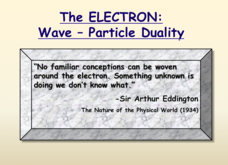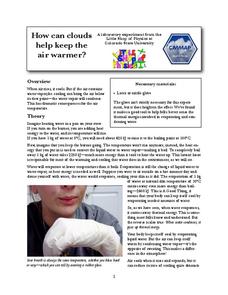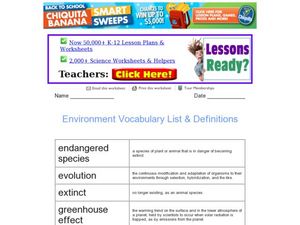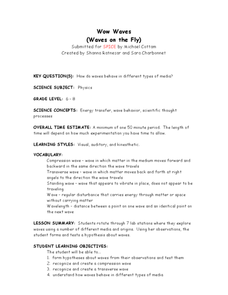Forest Foundation
Fire Investigation and Experimentation
Assess the probability of a wildfire with several lessons about fire danger ratings and risk factors. After experimenting with fuel moisture, learners explore the various elements that could contribute to a wildfire, such as wind...
It's About Time
Reflected Light
The lesson allows young scientists to use lasers and mirrors to study reflected light. A reading passage and homework question assess learning, while additional material introduces extension activities.
Pearson
The Chemical Context of Life
An educational presentation includes atoms, molecules, the four major elements, as well as neutrons and protons. Additionally, slides focus on atomic number, mass number, atomic weight, polar and nonpolar covalent bonding, ionic...
Columbus City Schools
Planet X
How did the earth become the mass that it is now? Your young scientists explore this question through the concept of density. Their inquiries consider the impact of gravity on the formation of planets. The culminating activity of the...
LABScI
Freezing Point Depression: Why Don’t Oceans Freeze?
Can you go ice fishing in the ocean? Learners examine the freezing point of different saltwater solutions. Each solution has a different concentration of salt. By comparing the freezing points graphically, they make conclusions...
Space Awareness
Model of a Black Hole
Even light cannot leave the force of a black hole! Learners use a model to explore the gravitational force of a black hole. An elastic bandage and heavy ball serve to create the hole, while marbles become the victims of its strong force.
It's About Time
Volcanic History of Your Community
Did you know there are 20 volcanoes erupting at any given time? Pupils look at various igneous rocks, read local geologic maps, and determine if their area has a history of volcanic activity. A reading passage and analysis questions...
Steinhardt Apps
Kinetic Molecular Theory
Building off young chemists' knowledge of the states of matter, kinetic molecular theory is the focus of the unit. Eight days of lessons including multiple demonstrations, one lab experiment, directed instruction, and worksheets,...
Science Geek
The Dual Nature of the Electron
Why don't atoms collapse? Scientists debated this concept for years before they understood the dual nature of the electron. Presentation discusses the electron as both a particle and an energy wave. It also relates these concepts to the...
Colorado State University
How Can Clouds Keep the Air Warmer?
Condensing water warms the air around it. Young scholars consider this concept as they experiment with air temperature around evaporating and condensing water vapor. They simulate the formation of clouds to experience the associated...
GNS Science
Think like a Geologist: 1
How well do pupils play the role of geologist? Test their abilities in the first installment of a two-part series. Presented with a series of rock formation diagrams, learners write stories to match what they see in the diagrams. The...
Curated OER
Physics
In this word search instructional activity, students search and find vocabulary
words as they relate to the subject of physics. Words may be located forward,
backward, up, down, and diagonally.
Curated OER
Physics Motion
In this physics worksheet, students identify and locate vocabulary terms related to high school physics motion, including projectile motion. There are 46 words located in the puzzle.
Curated OER
Environment Vocabulary and Definitions
In this environment worksheet, students are given a list of vocabulary words related to the environment and their definitions. Worksheet has no associated activities.
Curated OER
Natural History of Costa Rica
Students use outline maps to become acquainted with Costa Rica. They see how it was formed and how its origin has created very diverse environments. Students then use atlases and compare their physical maps with maps of climate and the...
Curated OER
Hide and Seek Science
Students examine macro-invertebrates in order to better understand their link to the food web. Working in groups, they record observations of several areas of a stream or river, collect samples from the river bottom, and identify the...
Curated OER
Science: Draining the Land - the Mississippi River
Students use topographic maps to identify parts of rivers. In addition, they discover gradient and predict changes in the channels caused by variations in water flow. Other activities include sketching a river model with a new channel...
Curated OER
Radioactivity
In this science worksheet, students focus upon the vocabulary terms focused around the theme of radioactivity. The answers are found by clicking the button at the bottom of the page.
Curated OER
Energy and Work: Transformation Through Engines
Students conduct a webquest on an energy source they chose. In this physics lesson, students design an experiment to determine the factors affecting potential and kinetic energy. They calculate speed and create distance vs. time graphs.
Curated OER
Energy and Work: Transformation through Engines
Students are introduced to the concept of thermodynamics. In groups, they participate in experiments in which they discover how potential energy converts into kinetic energy. They use the internet to research the components of a...
Curated OER
It Matters
Students use descriptive vocabulary to discuss the attributes of matter. Then, they sort objects or pictures by the type of matter they are comprised of. Finally, students match objects of matter with similar attributes and create a...
Curated OER
Go Car, Go!
Learners design and build their own car. In this physics instructional activity, students collect data to determine the speed of the car. They plot the data on the graph analyze the relationship between variables.
Curated OER
Wow Waves (Waves on the Fly)
Students formulate hypotheses on wave behavior and test them. In this physics lesson, students compare and contrast transverse and compression waves. They determine the wavelength of transverse waves.
Curated OER
Tornadoes
Students examine the characteristics of a tornado. They practice using new vocabulary and participate in a question and answer session. They use the internet to gather more specific information.























